Integrating Faith: Post Graduate Professional Practice Essay
VerifiedAdded on 2023/06/14
|9
|2581
|484
Essay
AI Summary
This essay examines the concepts of 'work', 'vocation', and 'calling' within a Christian framework, drawing from biblical texts to understand their significance. It discusses how God calls individuals to specific tasks and emphasizes that work should be an integral part of one's faith, reflecting God's creative and redemptive efforts. The essay highlights that 'calling' extends beyond paid employment to encompass various aspects of life, such as nurturing and service, and stresses the importance of balancing work with other essential elements like worship and rest. It concludes that while one's occupation is important, participating in God's work of creation and redemption is paramount, urging followers of Christ to prioritize the well-being of others and contribute to the betterment of society through their actions and professional endeavors. Desklib provides access to similar essays and study resources for students.
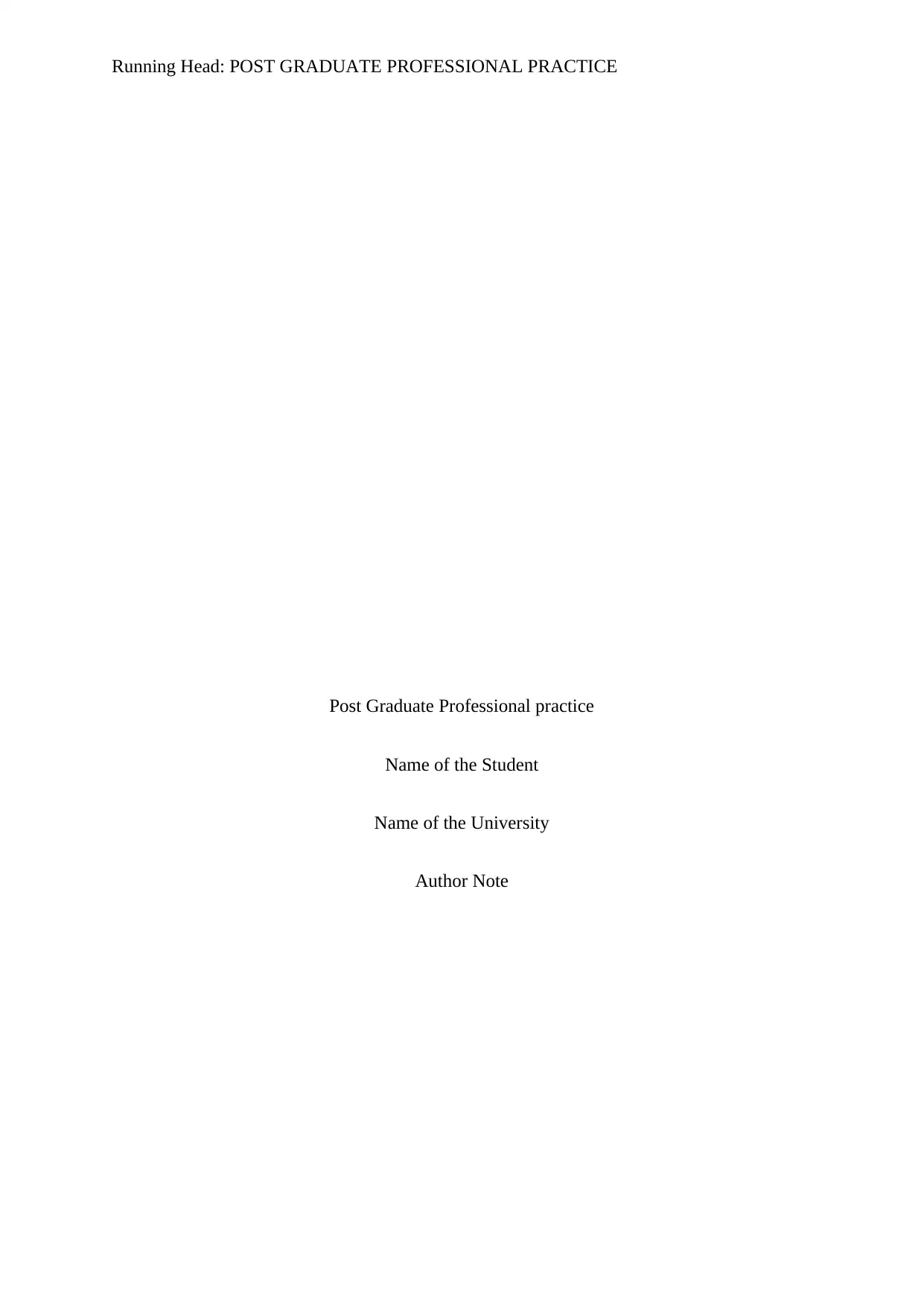
Running Head: POST GRADUATE PROFESSIONAL PRACTICE
Post Graduate Professional practice
Name of the Student
Name of the University
Author Note
Post Graduate Professional practice
Name of the Student
Name of the University
Author Note
Paraphrase This Document
Need a fresh take? Get an instant paraphrase of this document with our AI Paraphraser
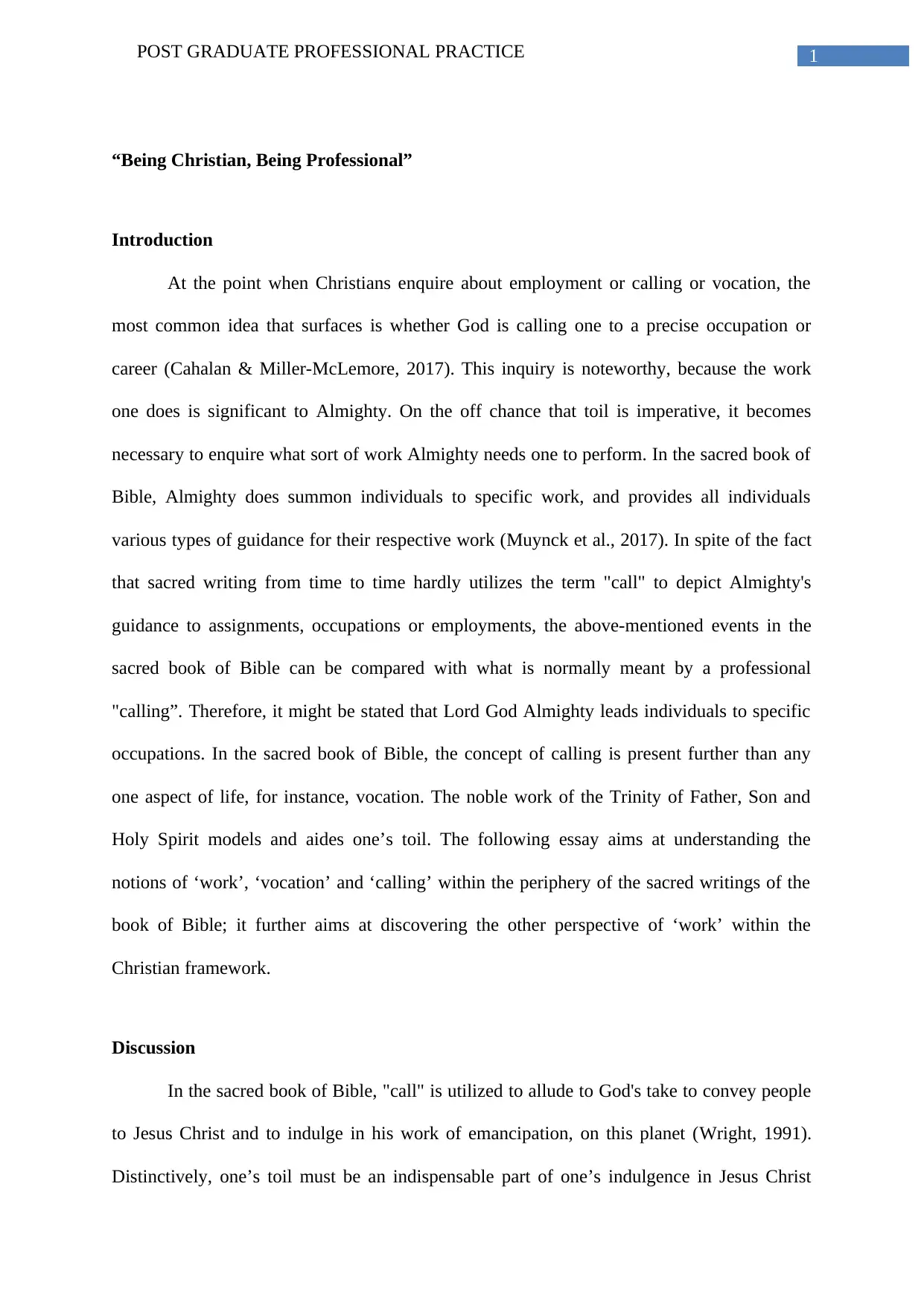
1POST GRADUATE PROFESSIONAL PRACTICE
“Being Christian, Being Professional”
Introduction
At the point when Christians enquire about employment or calling or vocation, the
most common idea that surfaces is whether God is calling one to a precise occupation or
career (Cahalan & Miller-McLemore, 2017). This inquiry is noteworthy, because the work
one does is significant to Almighty. On the off chance that toil is imperative, it becomes
necessary to enquire what sort of work Almighty needs one to perform. In the sacred book of
Bible, Almighty does summon individuals to specific work, and provides all individuals
various types of guidance for their respective work (Muynck et al., 2017). In spite of the fact
that sacred writing from time to time hardly utilizes the term "call" to depict Almighty's
guidance to assignments, occupations or employments, the above-mentioned events in the
sacred book of Bible can be compared with what is normally meant by a professional
"calling”. Therefore, it might be stated that Lord God Almighty leads individuals to specific
occupations. In the sacred book of Bible, the concept of calling is present further than any
one aspect of life, for instance, vocation. The noble work of the Trinity of Father, Son and
Holy Spirit models and aides one’s toil. The following essay aims at understanding the
notions of ‘work’, ‘vocation’ and ‘calling’ within the periphery of the sacred writings of the
book of Bible; it further aims at discovering the other perspective of ‘work’ within the
Christian framework.
Discussion
In the sacred book of Bible, "call" is utilized to allude to God's take to convey people
to Jesus Christ and to indulge in his work of emancipation, on this planet (Wright, 1991).
Distinctively, one’s toil must be an indispensable part of one’s indulgence in Jesus Christ
“Being Christian, Being Professional”
Introduction
At the point when Christians enquire about employment or calling or vocation, the
most common idea that surfaces is whether God is calling one to a precise occupation or
career (Cahalan & Miller-McLemore, 2017). This inquiry is noteworthy, because the work
one does is significant to Almighty. On the off chance that toil is imperative, it becomes
necessary to enquire what sort of work Almighty needs one to perform. In the sacred book of
Bible, Almighty does summon individuals to specific work, and provides all individuals
various types of guidance for their respective work (Muynck et al., 2017). In spite of the fact
that sacred writing from time to time hardly utilizes the term "call" to depict Almighty's
guidance to assignments, occupations or employments, the above-mentioned events in the
sacred book of Bible can be compared with what is normally meant by a professional
"calling”. Therefore, it might be stated that Lord God Almighty leads individuals to specific
occupations. In the sacred book of Bible, the concept of calling is present further than any
one aspect of life, for instance, vocation. The noble work of the Trinity of Father, Son and
Holy Spirit models and aides one’s toil. The following essay aims at understanding the
notions of ‘work’, ‘vocation’ and ‘calling’ within the periphery of the sacred writings of the
book of Bible; it further aims at discovering the other perspective of ‘work’ within the
Christian framework.
Discussion
In the sacred book of Bible, "call" is utilized to allude to God's take to convey people
to Jesus Christ and to indulge in his work of emancipation, on this planet (Wright, 1991).
Distinctively, one’s toil must be an indispensable part of one’s indulgence in Jesus Christ
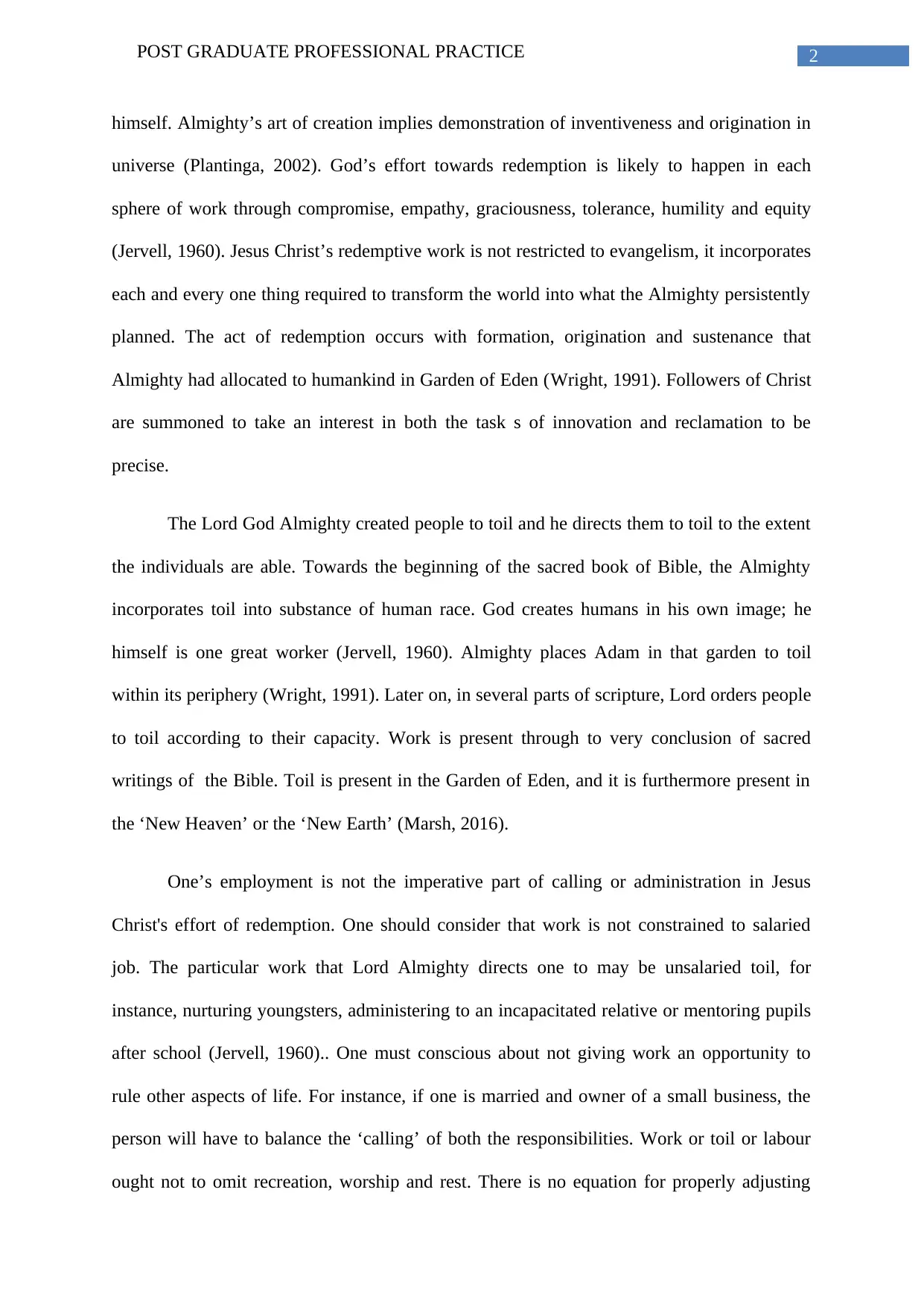
2POST GRADUATE PROFESSIONAL PRACTICE
himself. Almighty’s art of creation implies demonstration of inventiveness and origination in
universe (Plantinga, 2002). God’s effort towards redemption is likely to happen in each
sphere of work through compromise, empathy, graciousness, tolerance, humility and equity
(Jervell, 1960). Jesus Christ’s redemptive work is not restricted to evangelism, it incorporates
each and every one thing required to transform the world into what the Almighty persistently
planned. The act of redemption occurs with formation, origination and sustenance that
Almighty had allocated to humankind in Garden of Eden (Wright, 1991). Followers of Christ
are summoned to take an interest in both the task s of innovation and reclamation to be
precise.
The Lord God Almighty created people to toil and he directs them to toil to the extent
the individuals are able. Towards the beginning of the sacred book of Bible, the Almighty
incorporates toil into substance of human race. God creates humans in his own image; he
himself is one great worker (Jervell, 1960). Almighty places Adam in that garden to toil
within its periphery (Wright, 1991). Later on, in several parts of scripture, Lord orders people
to toil according to their capacity. Work is present through to very conclusion of sacred
writings of the Bible. Toil is present in the Garden of Eden, and it is furthermore present in
the ‘New Heaven’ or the ‘New Earth’ (Marsh, 2016).
One’s employment is not the imperative part of calling or administration in Jesus
Christ's effort of redemption. One should consider that work is not constrained to salaried
job. The particular work that Lord Almighty directs one to may be unsalaried toil, for
instance, nurturing youngsters, administering to an incapacitated relative or mentoring pupils
after school (Jervell, 1960).. One must conscious about not giving work an opportunity to
rule other aspects of life. For instance, if one is married and owner of a small business, the
person will have to balance the ‘calling’ of both the responsibilities. Work or toil or labour
ought not to omit recreation, worship and rest. There is no equation for properly adjusting
himself. Almighty’s art of creation implies demonstration of inventiveness and origination in
universe (Plantinga, 2002). God’s effort towards redemption is likely to happen in each
sphere of work through compromise, empathy, graciousness, tolerance, humility and equity
(Jervell, 1960). Jesus Christ’s redemptive work is not restricted to evangelism, it incorporates
each and every one thing required to transform the world into what the Almighty persistently
planned. The act of redemption occurs with formation, origination and sustenance that
Almighty had allocated to humankind in Garden of Eden (Wright, 1991). Followers of Christ
are summoned to take an interest in both the task s of innovation and reclamation to be
precise.
The Lord God Almighty created people to toil and he directs them to toil to the extent
the individuals are able. Towards the beginning of the sacred book of Bible, the Almighty
incorporates toil into substance of human race. God creates humans in his own image; he
himself is one great worker (Jervell, 1960). Almighty places Adam in that garden to toil
within its periphery (Wright, 1991). Later on, in several parts of scripture, Lord orders people
to toil according to their capacity. Work is present through to very conclusion of sacred
writings of the Bible. Toil is present in the Garden of Eden, and it is furthermore present in
the ‘New Heaven’ or the ‘New Earth’ (Marsh, 2016).
One’s employment is not the imperative part of calling or administration in Jesus
Christ's effort of redemption. One should consider that work is not constrained to salaried
job. The particular work that Lord Almighty directs one to may be unsalaried toil, for
instance, nurturing youngsters, administering to an incapacitated relative or mentoring pupils
after school (Jervell, 1960).. One must conscious about not giving work an opportunity to
rule other aspects of life. For instance, if one is married and owner of a small business, the
person will have to balance the ‘calling’ of both the responsibilities. Work or toil or labour
ought not to omit recreation, worship and rest. There is no equation for properly adjusting
⊘ This is a preview!⊘
Do you want full access?
Subscribe today to unlock all pages.

Trusted by 1+ million students worldwide
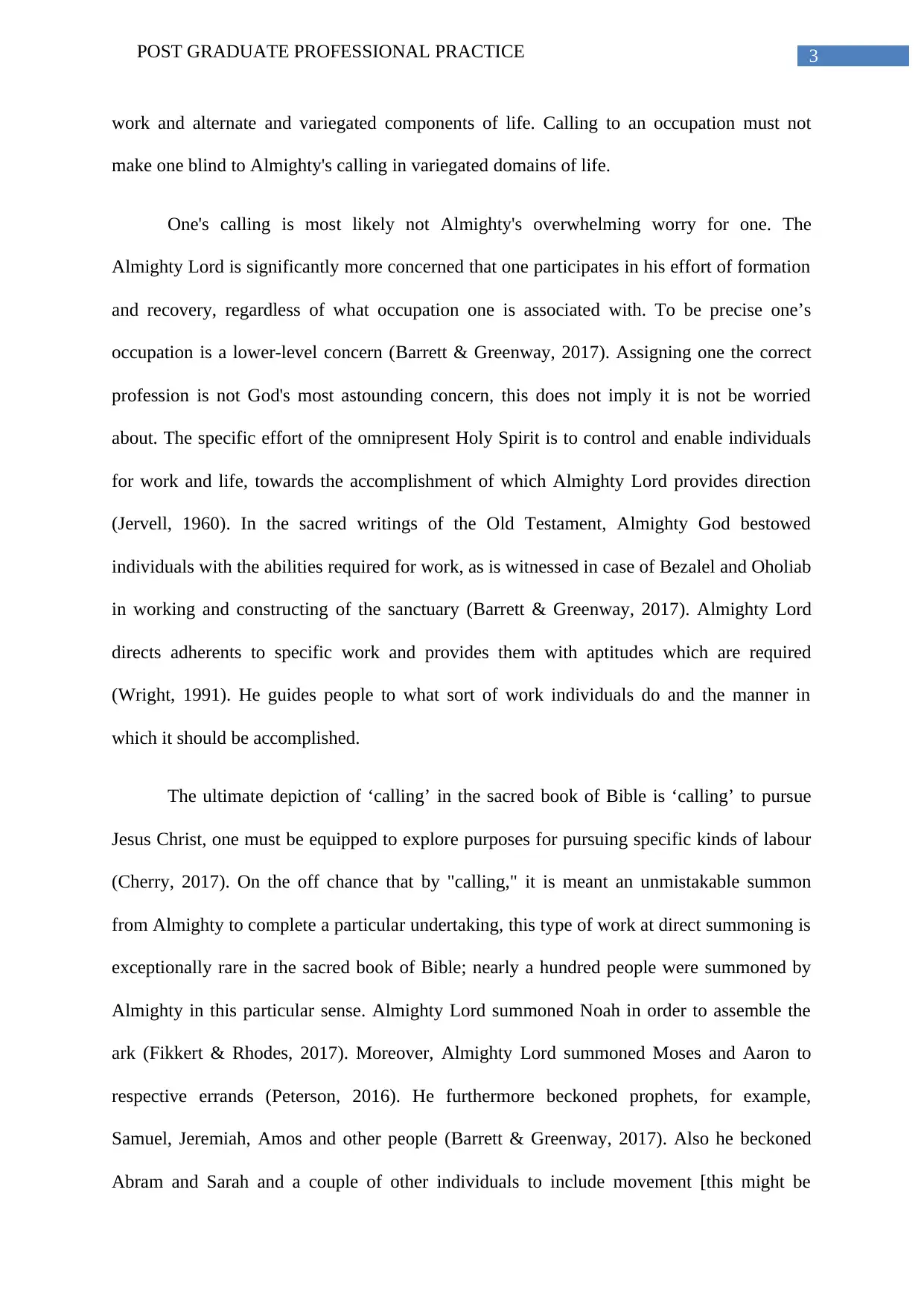
3POST GRADUATE PROFESSIONAL PRACTICE
work and alternate and variegated components of life. Calling to an occupation must not
make one blind to Almighty's calling in variegated domains of life.
One's calling is most likely not Almighty's overwhelming worry for one. The
Almighty Lord is significantly more concerned that one participates in his effort of formation
and recovery, regardless of what occupation one is associated with. To be precise one’s
occupation is a lower-level concern (Barrett & Greenway, 2017). Assigning one the correct
profession is not God's most astounding concern, this does not imply it is not be worried
about. The specific effort of the omnipresent Holy Spirit is to control and enable individuals
for work and life, towards the accomplishment of which Almighty Lord provides direction
(Jervell, 1960). In the sacred writings of the Old Testament, Almighty God bestowed
individuals with the abilities required for work, as is witnessed in case of Bezalel and Oholiab
in working and constructing of the sanctuary (Barrett & Greenway, 2017). Almighty Lord
directs adherents to specific work and provides them with aptitudes which are required
(Wright, 1991). He guides people to what sort of work individuals do and the manner in
which it should be accomplished.
The ultimate depiction of ‘calling’ in the sacred book of Bible is ‘calling’ to pursue
Jesus Christ, one must be equipped to explore purposes for pursuing specific kinds of labour
(Cherry, 2017). On the off chance that by "calling," it is meant an unmistakable summon
from Almighty to complete a particular undertaking, this type of work at direct summoning is
exceptionally rare in the sacred book of Bible; nearly a hundred people were summoned by
Almighty in this particular sense. Almighty Lord summoned Noah in order to assemble the
ark (Fikkert & Rhodes, 2017). Moreover, Almighty Lord summoned Moses and Aaron to
respective errands (Peterson, 2016). He furthermore beckoned prophets, for example,
Samuel, Jeremiah, Amos and other people (Barrett & Greenway, 2017). Also he beckoned
Abram and Sarah and a couple of other individuals to include movement [this might be
work and alternate and variegated components of life. Calling to an occupation must not
make one blind to Almighty's calling in variegated domains of life.
One's calling is most likely not Almighty's overwhelming worry for one. The
Almighty Lord is significantly more concerned that one participates in his effort of formation
and recovery, regardless of what occupation one is associated with. To be precise one’s
occupation is a lower-level concern (Barrett & Greenway, 2017). Assigning one the correct
profession is not God's most astounding concern, this does not imply it is not be worried
about. The specific effort of the omnipresent Holy Spirit is to control and enable individuals
for work and life, towards the accomplishment of which Almighty Lord provides direction
(Jervell, 1960). In the sacred writings of the Old Testament, Almighty God bestowed
individuals with the abilities required for work, as is witnessed in case of Bezalel and Oholiab
in working and constructing of the sanctuary (Barrett & Greenway, 2017). Almighty Lord
directs adherents to specific work and provides them with aptitudes which are required
(Wright, 1991). He guides people to what sort of work individuals do and the manner in
which it should be accomplished.
The ultimate depiction of ‘calling’ in the sacred book of Bible is ‘calling’ to pursue
Jesus Christ, one must be equipped to explore purposes for pursuing specific kinds of labour
(Cherry, 2017). On the off chance that by "calling," it is meant an unmistakable summon
from Almighty to complete a particular undertaking, this type of work at direct summoning is
exceptionally rare in the sacred book of Bible; nearly a hundred people were summoned by
Almighty in this particular sense. Almighty Lord summoned Noah in order to assemble the
ark (Fikkert & Rhodes, 2017). Moreover, Almighty Lord summoned Moses and Aaron to
respective errands (Peterson, 2016). He furthermore beckoned prophets, for example,
Samuel, Jeremiah, Amos and other people (Barrett & Greenway, 2017). Also he beckoned
Abram and Sarah and a couple of other individuals to include movement [this might be
Paraphrase This Document
Need a fresh take? Get an instant paraphrase of this document with our AI Paraphraser
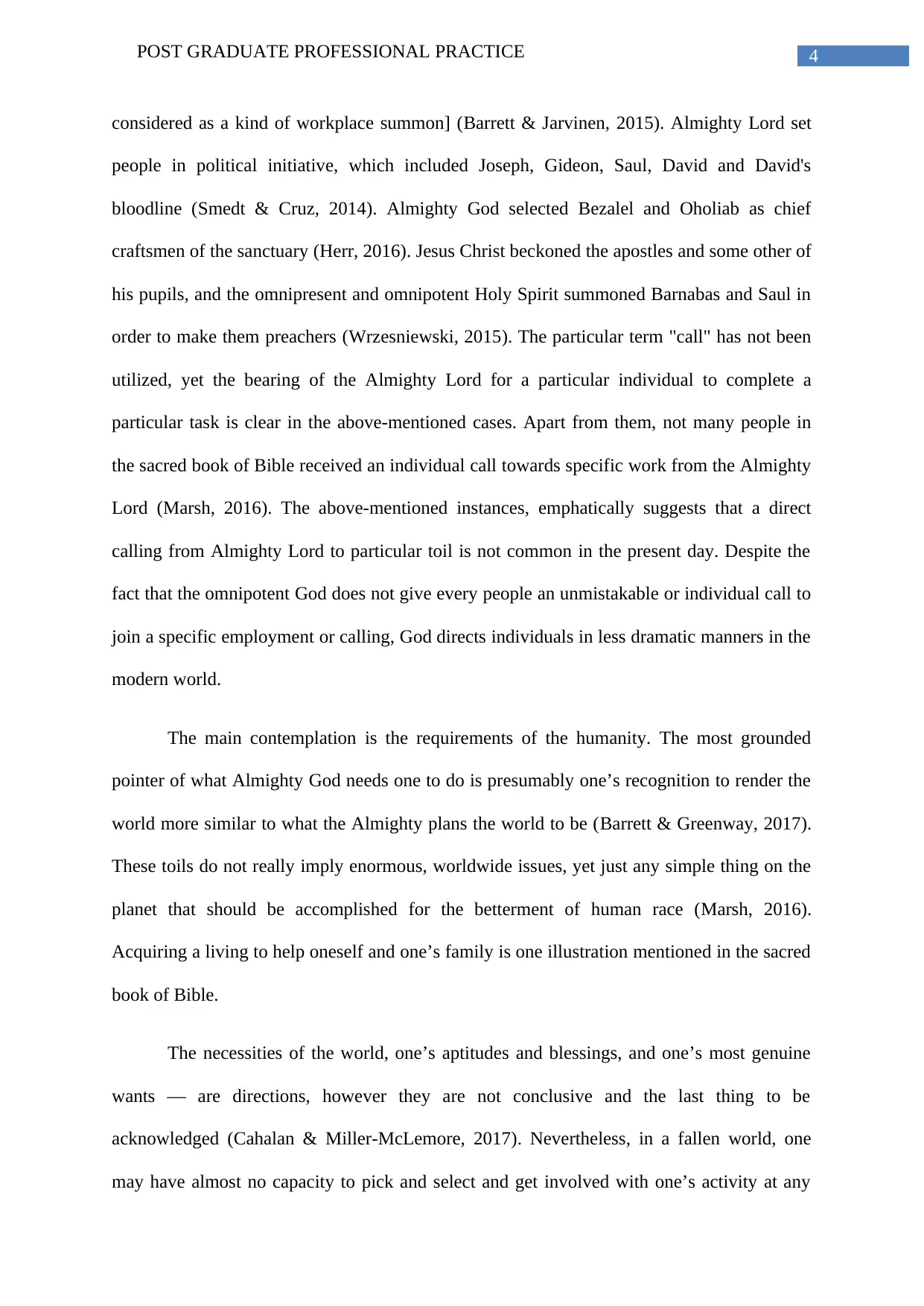
4POST GRADUATE PROFESSIONAL PRACTICE
considered as a kind of workplace summon] (Barrett & Jarvinen, 2015). Almighty Lord set
people in political initiative, which included Joseph, Gideon, Saul, David and David's
bloodline (Smedt & Cruz, 2014). Almighty God selected Bezalel and Oholiab as chief
craftsmen of the sanctuary (Herr, 2016). Jesus Christ beckoned the apostles and some other of
his pupils, and the omnipresent and omnipotent Holy Spirit summoned Barnabas and Saul in
order to make them preachers (Wrzesniewski, 2015). The particular term "call" has not been
utilized, yet the bearing of the Almighty Lord for a particular individual to complete a
particular task is clear in the above-mentioned cases. Apart from them, not many people in
the sacred book of Bible received an individual call towards specific work from the Almighty
Lord (Marsh, 2016). The above-mentioned instances, emphatically suggests that a direct
calling from Almighty Lord to particular toil is not common in the present day. Despite the
fact that the omnipotent God does not give every people an unmistakable or individual call to
join a specific employment or calling, God directs individuals in less dramatic manners in the
modern world.
The main contemplation is the requirements of the humanity. The most grounded
pointer of what Almighty God needs one to do is presumably one’s recognition to render the
world more similar to what the Almighty plans the world to be (Barrett & Greenway, 2017).
These toils do not really imply enormous, worldwide issues, yet just any simple thing on the
planet that should be accomplished for the betterment of human race (Marsh, 2016).
Acquiring a living to help oneself and one’s family is one illustration mentioned in the sacred
book of Bible.
The necessities of the world, one’s aptitudes and blessings, and one’s most genuine
wants — are directions, however they are not conclusive and the last thing to be
acknowledged (Cahalan & Miller-McLemore, 2017). Nevertheless, in a fallen world, one
may have almost no capacity to pick and select and get involved with one’s activity at any
considered as a kind of workplace summon] (Barrett & Jarvinen, 2015). Almighty Lord set
people in political initiative, which included Joseph, Gideon, Saul, David and David's
bloodline (Smedt & Cruz, 2014). Almighty God selected Bezalel and Oholiab as chief
craftsmen of the sanctuary (Herr, 2016). Jesus Christ beckoned the apostles and some other of
his pupils, and the omnipresent and omnipotent Holy Spirit summoned Barnabas and Saul in
order to make them preachers (Wrzesniewski, 2015). The particular term "call" has not been
utilized, yet the bearing of the Almighty Lord for a particular individual to complete a
particular task is clear in the above-mentioned cases. Apart from them, not many people in
the sacred book of Bible received an individual call towards specific work from the Almighty
Lord (Marsh, 2016). The above-mentioned instances, emphatically suggests that a direct
calling from Almighty Lord to particular toil is not common in the present day. Despite the
fact that the omnipotent God does not give every people an unmistakable or individual call to
join a specific employment or calling, God directs individuals in less dramatic manners in the
modern world.
The main contemplation is the requirements of the humanity. The most grounded
pointer of what Almighty God needs one to do is presumably one’s recognition to render the
world more similar to what the Almighty plans the world to be (Barrett & Greenway, 2017).
These toils do not really imply enormous, worldwide issues, yet just any simple thing on the
planet that should be accomplished for the betterment of human race (Marsh, 2016).
Acquiring a living to help oneself and one’s family is one illustration mentioned in the sacred
book of Bible.
The necessities of the world, one’s aptitudes and blessings, and one’s most genuine
wants — are directions, however they are not conclusive and the last thing to be
acknowledged (Cahalan & Miller-McLemore, 2017). Nevertheless, in a fallen world, one
may have almost no capacity to pick and select and get involved with one’s activity at any
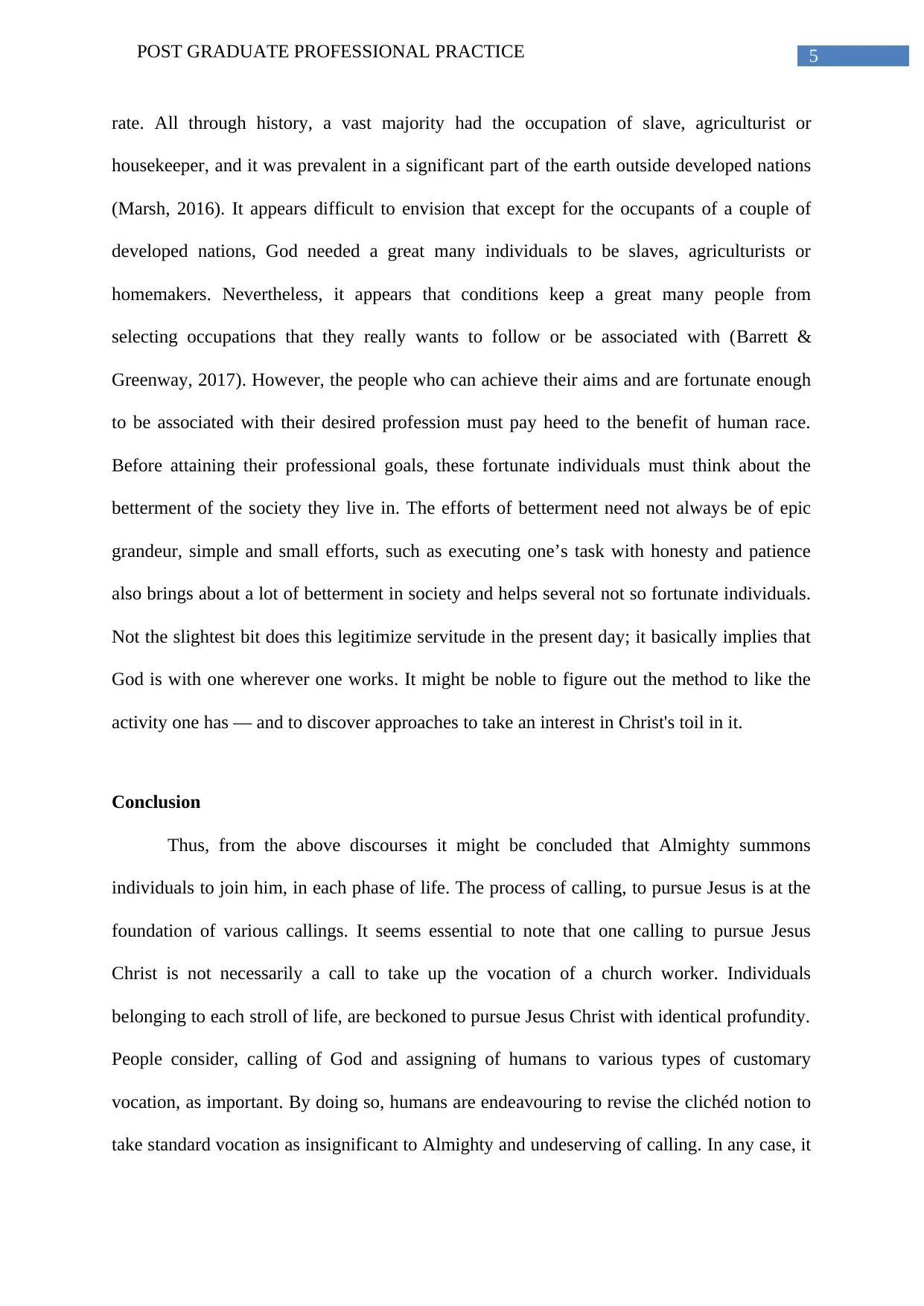
5POST GRADUATE PROFESSIONAL PRACTICE
rate. All through history, a vast majority had the occupation of slave, agriculturist or
housekeeper, and it was prevalent in a significant part of the earth outside developed nations
(Marsh, 2016). It appears difficult to envision that except for the occupants of a couple of
developed nations, God needed a great many individuals to be slaves, agriculturists or
homemakers. Nevertheless, it appears that conditions keep a great many people from
selecting occupations that they really wants to follow or be associated with (Barrett &
Greenway, 2017). However, the people who can achieve their aims and are fortunate enough
to be associated with their desired profession must pay heed to the benefit of human race.
Before attaining their professional goals, these fortunate individuals must think about the
betterment of the society they live in. The efforts of betterment need not always be of epic
grandeur, simple and small efforts, such as executing one’s task with honesty and patience
also brings about a lot of betterment in society and helps several not so fortunate individuals.
Not the slightest bit does this legitimize servitude in the present day; it basically implies that
God is with one wherever one works. It might be noble to figure out the method to like the
activity one has — and to discover approaches to take an interest in Christ's toil in it.
Conclusion
Thus, from the above discourses it might be concluded that Almighty summons
individuals to join him, in each phase of life. The process of calling, to pursue Jesus is at the
foundation of various callings. It seems essential to note that one calling to pursue Jesus
Christ is not necessarily a call to take up the vocation of a church worker. Individuals
belonging to each stroll of life, are beckoned to pursue Jesus Christ with identical profundity.
People consider, calling of God and assigning of humans to various types of customary
vocation, as important. By doing so, humans are endeavouring to revise the clichéd notion to
take standard vocation as insignificant to Almighty and undeserving of calling. In any case, it
rate. All through history, a vast majority had the occupation of slave, agriculturist or
housekeeper, and it was prevalent in a significant part of the earth outside developed nations
(Marsh, 2016). It appears difficult to envision that except for the occupants of a couple of
developed nations, God needed a great many individuals to be slaves, agriculturists or
homemakers. Nevertheless, it appears that conditions keep a great many people from
selecting occupations that they really wants to follow or be associated with (Barrett &
Greenway, 2017). However, the people who can achieve their aims and are fortunate enough
to be associated with their desired profession must pay heed to the benefit of human race.
Before attaining their professional goals, these fortunate individuals must think about the
betterment of the society they live in. The efforts of betterment need not always be of epic
grandeur, simple and small efforts, such as executing one’s task with honesty and patience
also brings about a lot of betterment in society and helps several not so fortunate individuals.
Not the slightest bit does this legitimize servitude in the present day; it basically implies that
God is with one wherever one works. It might be noble to figure out the method to like the
activity one has — and to discover approaches to take an interest in Christ's toil in it.
Conclusion
Thus, from the above discourses it might be concluded that Almighty summons
individuals to join him, in each phase of life. The process of calling, to pursue Jesus is at the
foundation of various callings. It seems essential to note that one calling to pursue Jesus
Christ is not necessarily a call to take up the vocation of a church worker. Individuals
belonging to each stroll of life, are beckoned to pursue Jesus Christ with identical profundity.
People consider, calling of God and assigning of humans to various types of customary
vocation, as important. By doing so, humans are endeavouring to revise the clichéd notion to
take standard vocation as insignificant to Almighty and undeserving of calling. In any case, it
⊘ This is a preview!⊘
Do you want full access?
Subscribe today to unlock all pages.

Trusted by 1+ million students worldwide
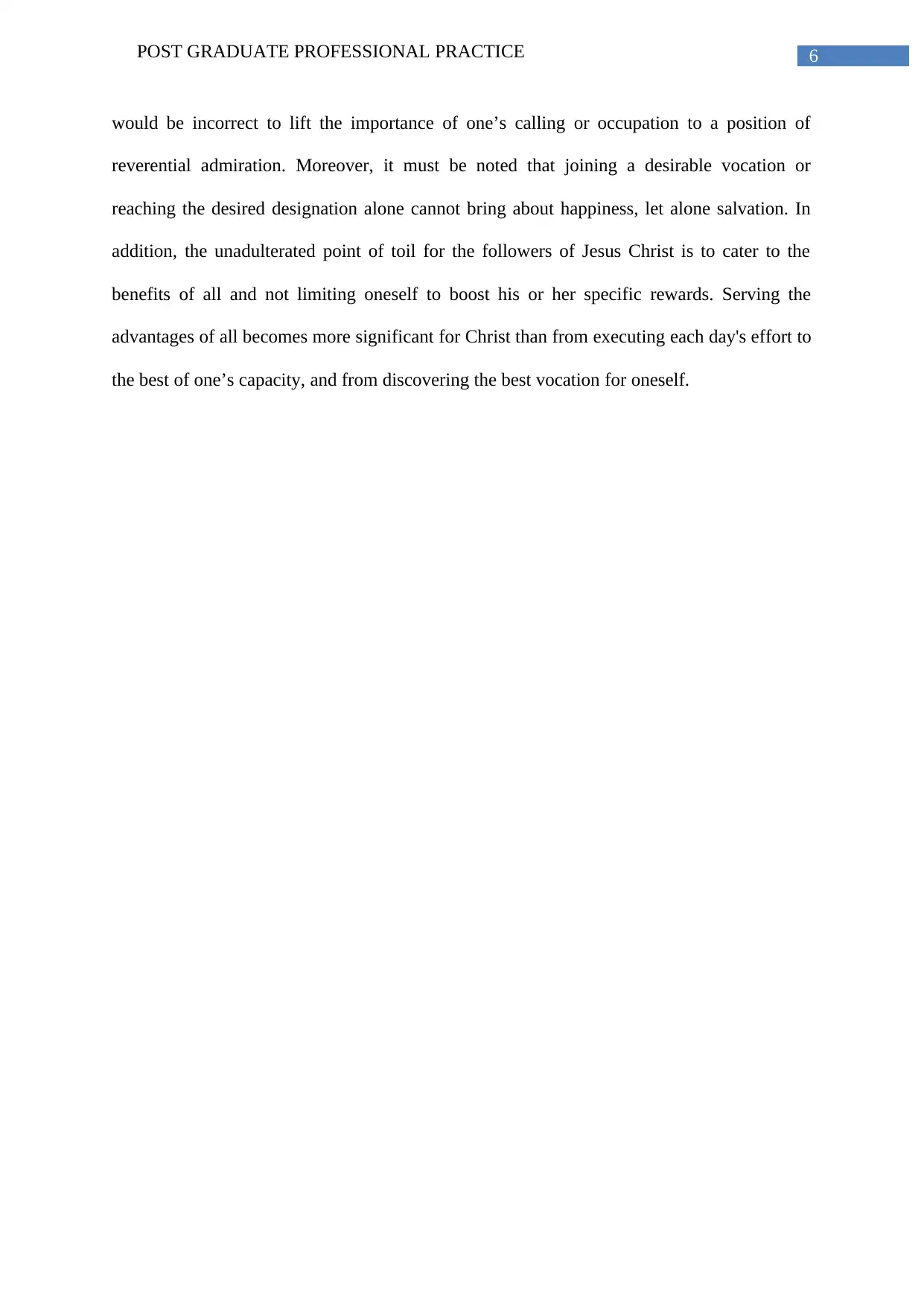
6POST GRADUATE PROFESSIONAL PRACTICE
would be incorrect to lift the importance of one’s calling or occupation to a position of
reverential admiration. Moreover, it must be noted that joining a desirable vocation or
reaching the desired designation alone cannot bring about happiness, let alone salvation. In
addition, the unadulterated point of toil for the followers of Jesus Christ is to cater to the
benefits of all and not limiting oneself to boost his or her specific rewards. Serving the
advantages of all becomes more significant for Christ than from executing each day's effort to
the best of one’s capacity, and from discovering the best vocation for oneself.
would be incorrect to lift the importance of one’s calling or occupation to a position of
reverential admiration. Moreover, it must be noted that joining a desirable vocation or
reaching the desired designation alone cannot bring about happiness, let alone salvation. In
addition, the unadulterated point of toil for the followers of Jesus Christ is to cater to the
benefits of all and not limiting oneself to boost his or her specific rewards. Serving the
advantages of all becomes more significant for Christ than from executing each day's effort to
the best of one’s capacity, and from discovering the best vocation for oneself.
Paraphrase This Document
Need a fresh take? Get an instant paraphrase of this document with our AI Paraphraser
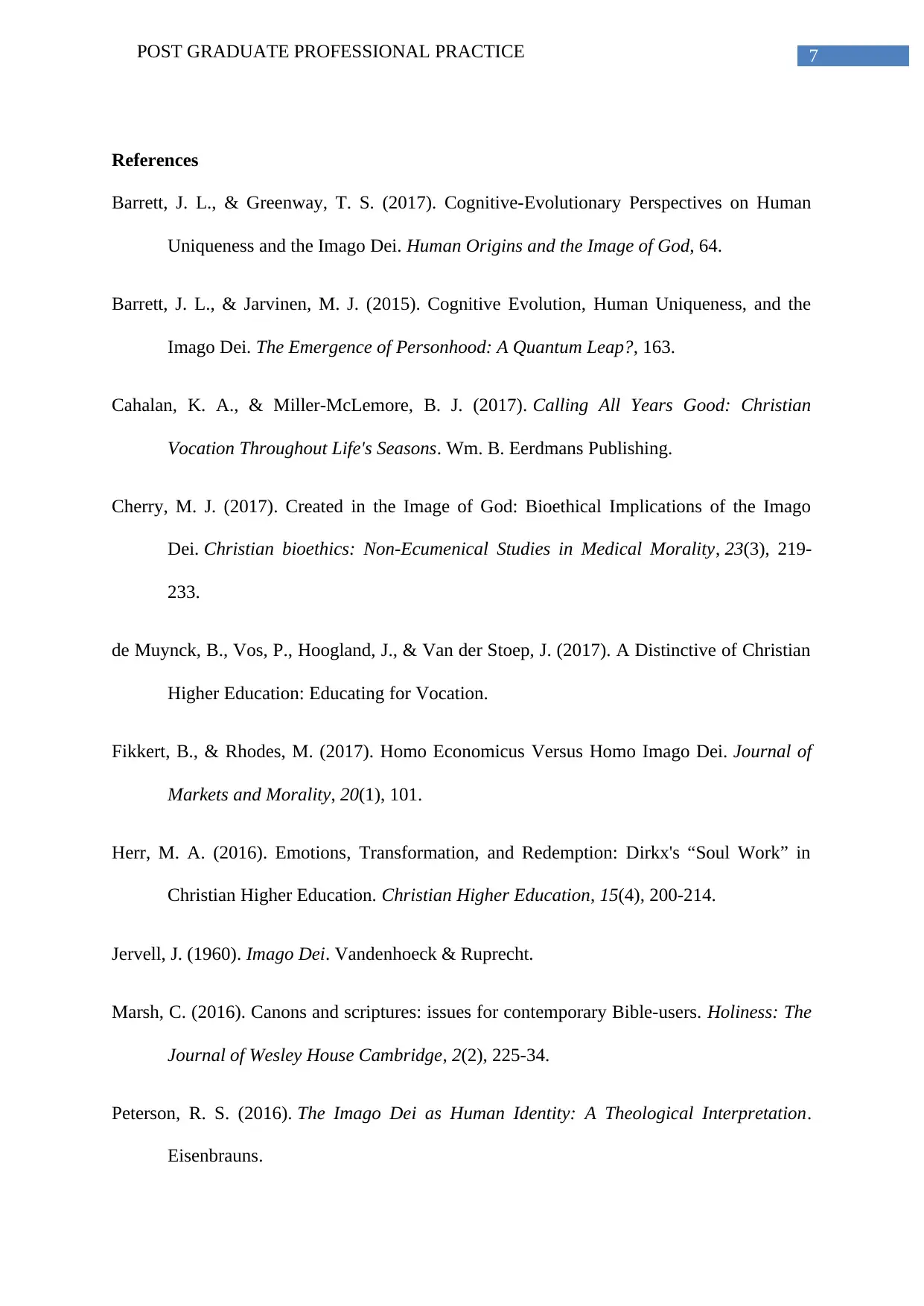
7POST GRADUATE PROFESSIONAL PRACTICE
References
Barrett, J. L., & Greenway, T. S. (2017). Cognitive-Evolutionary Perspectives on Human
Uniqueness and the Imago Dei. Human Origins and the Image of God, 64.
Barrett, J. L., & Jarvinen, M. J. (2015). Cognitive Evolution, Human Uniqueness, and the
Imago Dei. The Emergence of Personhood: A Quantum Leap?, 163.
Cahalan, K. A., & Miller-McLemore, B. J. (2017). Calling All Years Good: Christian
Vocation Throughout Life's Seasons. Wm. B. Eerdmans Publishing.
Cherry, M. J. (2017). Created in the Image of God: Bioethical Implications of the Imago
Dei. Christian bioethics: Non-Ecumenical Studies in Medical Morality, 23(3), 219-
233.
de Muynck, B., Vos, P., Hoogland, J., & Van der Stoep, J. (2017). A Distinctive of Christian
Higher Education: Educating for Vocation.
Fikkert, B., & Rhodes, M. (2017). Homo Economicus Versus Homo Imago Dei. Journal of
Markets and Morality, 20(1), 101.
Herr, M. A. (2016). Emotions, Transformation, and Redemption: Dirkx's “Soul Work” in
Christian Higher Education. Christian Higher Education, 15(4), 200-214.
Jervell, J. (1960). Imago Dei. Vandenhoeck & Ruprecht.
Marsh, C. (2016). Canons and scriptures: issues for contemporary Bible-users. Holiness: The
Journal of Wesley House Cambridge, 2(2), 225-34.
Peterson, R. S. (2016). The Imago Dei as Human Identity: A Theological Interpretation.
Eisenbrauns.
References
Barrett, J. L., & Greenway, T. S. (2017). Cognitive-Evolutionary Perspectives on Human
Uniqueness and the Imago Dei. Human Origins and the Image of God, 64.
Barrett, J. L., & Jarvinen, M. J. (2015). Cognitive Evolution, Human Uniqueness, and the
Imago Dei. The Emergence of Personhood: A Quantum Leap?, 163.
Cahalan, K. A., & Miller-McLemore, B. J. (2017). Calling All Years Good: Christian
Vocation Throughout Life's Seasons. Wm. B. Eerdmans Publishing.
Cherry, M. J. (2017). Created in the Image of God: Bioethical Implications of the Imago
Dei. Christian bioethics: Non-Ecumenical Studies in Medical Morality, 23(3), 219-
233.
de Muynck, B., Vos, P., Hoogland, J., & Van der Stoep, J. (2017). A Distinctive of Christian
Higher Education: Educating for Vocation.
Fikkert, B., & Rhodes, M. (2017). Homo Economicus Versus Homo Imago Dei. Journal of
Markets and Morality, 20(1), 101.
Herr, M. A. (2016). Emotions, Transformation, and Redemption: Dirkx's “Soul Work” in
Christian Higher Education. Christian Higher Education, 15(4), 200-214.
Jervell, J. (1960). Imago Dei. Vandenhoeck & Ruprecht.
Marsh, C. (2016). Canons and scriptures: issues for contemporary Bible-users. Holiness: The
Journal of Wesley House Cambridge, 2(2), 225-34.
Peterson, R. S. (2016). The Imago Dei as Human Identity: A Theological Interpretation.
Eisenbrauns.
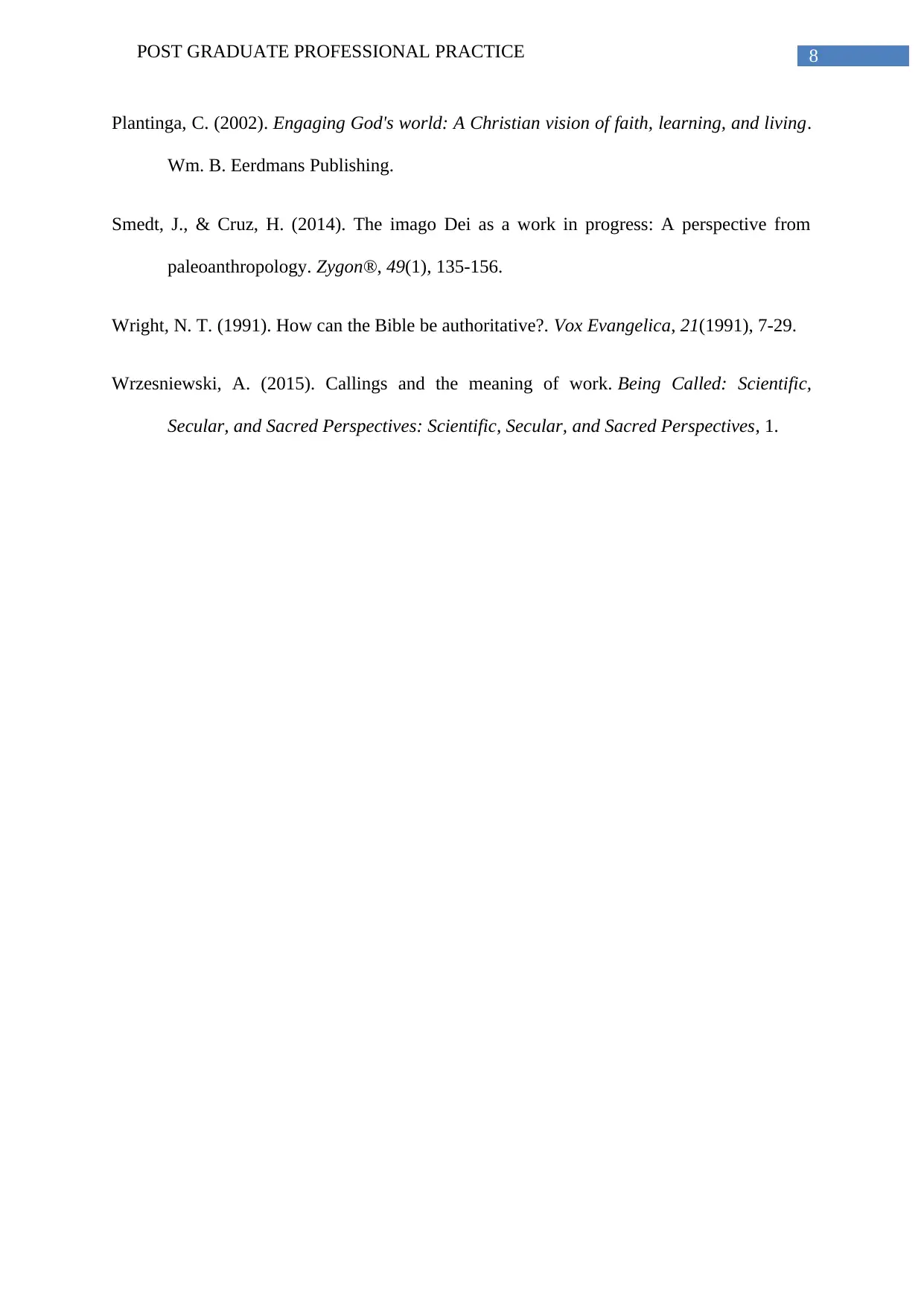
8POST GRADUATE PROFESSIONAL PRACTICE
Plantinga, C. (2002). Engaging God's world: A Christian vision of faith, learning, and living.
Wm. B. Eerdmans Publishing.
Smedt, J., & Cruz, H. (2014). The imago Dei as a work in progress: A perspective from
paleoanthropology. Zygon®, 49(1), 135-156.
Wright, N. T. (1991). How can the Bible be authoritative?. Vox Evangelica, 21(1991), 7-29.
Wrzesniewski, A. (2015). Callings and the meaning of work. Being Called: Scientific,
Secular, and Sacred Perspectives: Scientific, Secular, and Sacred Perspectives, 1.
Plantinga, C. (2002). Engaging God's world: A Christian vision of faith, learning, and living.
Wm. B. Eerdmans Publishing.
Smedt, J., & Cruz, H. (2014). The imago Dei as a work in progress: A perspective from
paleoanthropology. Zygon®, 49(1), 135-156.
Wright, N. T. (1991). How can the Bible be authoritative?. Vox Evangelica, 21(1991), 7-29.
Wrzesniewski, A. (2015). Callings and the meaning of work. Being Called: Scientific,
Secular, and Sacred Perspectives: Scientific, Secular, and Sacred Perspectives, 1.
⊘ This is a preview!⊘
Do you want full access?
Subscribe today to unlock all pages.

Trusted by 1+ million students worldwide
1 out of 9
Your All-in-One AI-Powered Toolkit for Academic Success.
+13062052269
info@desklib.com
Available 24*7 on WhatsApp / Email
![[object Object]](/_next/static/media/star-bottom.7253800d.svg)
Unlock your academic potential
Copyright © 2020–2026 A2Z Services. All Rights Reserved. Developed and managed by ZUCOL.